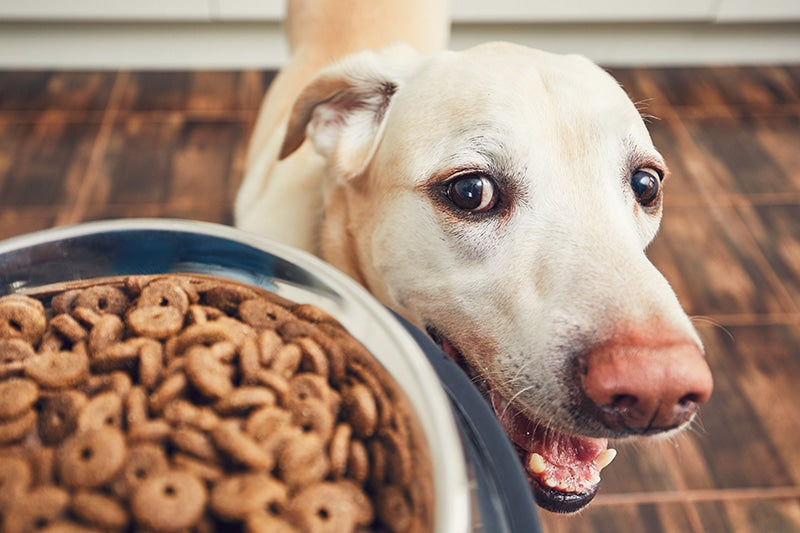Labrador Retrievers, beloved for their friendly nature and boundless energy, deserve the very best when it comes to their diet. Just like us, our furry friends need nutritious meals to live their happiest, healthiest lives. It's not just about filling their bowls with any old food. There are important considerations to keep in mind, from selecting the right type of food to establishing a consistent feeding routine. You will find all that more in this guide.
What to Feed Your Labrador
When it comes to feeding your Labrador, there are several options to consider, including dry kibble, wet food, or homemade meals. Each has its own benefits, so your choice depends on what suits your dog's needs and preferences.
Dry Kibble:
-
Pros:
- Convenient and easy to store
- Promotes dental health by helping to reduce plaque and tartar buildup
- Available in a wide variety of flavors and formulations to suit different dietary needs
-
Cons:
- May contain artificial additives and preservatives
- Some dogs may find it less palatable than wet food
- Can be more challenging for older dogs or those with dental issues to chew
Wet Food:
-
Pros:
- Higher moisture content can help keep your Labrador hydrated
- Often more palatable for picky eaters
- Provides a variety of textures and flavors to keep mealtime interesting
-
Cons:
- Requires refrigeration once opened and may spoil more quickly
- Can be messier to serve and clean up
- May be more expensive than dry kibble options
Homemade Meals:
-
Pros:
- Allows you to control the quality and freshness of ingredients
- Can accommodate specific dietary restrictions or preferences
- Provides the opportunity for variety and rotation in your dog's diet
-
Cons:
- Requires time and effort for meal preparation
- May lack essential nutrients if not properly balanced
- Can be more expensive and time-consuming than commercial options
High-quality protein is crucial for the health and well-being of Labrador Retrievers. Look for foods that list a protein source, such as chicken, fish, or lamb, as the first ingredient. These proteins provide essential amino acids that support muscle growth and overall vitality.
Be mindful of common allergens and fillers that may cause digestive issues or allergic reactions in your Labrador. Avoid ingredients like corn, wheat, and soy, as well as artificial additives and preservatives. Opt for natural, whole-food ingredients that are easy for your dog to digest.
Don't forget to incorporate fruits and vegetables into your Labrador's diet for added nutrition. Fruits like apples, berries, and bananas can provide vitamins and antioxidants, while vegetables like carrots, spinach, and sweet potatoes offer fiber and essential nutrients. Just be sure to chop them into bite-sized pieces and remove any seeds or pits before feeding them to your furry friend.

Feeding Schedule
When it comes to feeding your Labrador, establishing a consistent feeding schedule is important. Puppies typically require more frequent meals, with three to four small meals spread throughout the day. As they grow older, you can transition to feeding them two larger meals per day - breakfast and dinner. You can adjust portion sizes based on your dog's age, weight, and activity level to prevent overfeeding or underfeeding. A general guideline is to measure out the appropriate amount of food recommended by your veterinarian or the dog food packaging. Sticking to a consistent feeding routine helps regulate your Labrador's digestive system and promotes healthy eating habits.
Mealtime Practices
When it comes to mealtime practices for your Labrador, there are a few key considerations to keep in mind. Firstly, it's essential to encourage slow feeding to prevent issues like bloat and digestive discomfort. This can be done by using specialized slow feeder bowls or puzzle toys that make your dog work for their food, slowing down their eating pace.
Using interactive feeding toys not only promotes mental stimulation but also prevents boredom and overeating. Monitor your dog's food intake and adjust portion sizes as needed to maintain a healthy weight. Remember to encourage proper chewing habits and discourage food aggression by providing appropriate chew toys and ensuring a calm feeding environment.
Hydration
Always make sure that your Labrador has access to clean, fresh water at all times. Make sure to regularly refill their water bowl and clean it to prevent any rashes. Monitor your dog's water intake, especially during hot weather or after exercise, so that they stay adequately hydrated. Signs of dehydration in dogs include excessive panting, dry gums, lethargy, and loss of skin elasticity. If you notice any of these signs, encourage your Labrador to drink more water and seek veterinary attention if needed.
When to Consult a Vet
Knowing when to consult a vet regarding your Labrador's diet is essential for their overall health and well-being. If you notice signs of food allergies or intolerances, such as itching, vomiting, or diarrhea, it's crucial to seek veterinary advice promptly. Similarly, persistent digestive issues or changes in appetite could indicate an underlying problem that requires professional attention. Keep an eye on your Labrador's weight, as rapid gain or loss could signal an issue with their diet or metabolism. Additionally, if your Labrador has specific health conditions that require dietary modifications, consult your vet for personalized recommendations. By staying proactive and seeking veterinary guidance when needed, you can ensure that your Labrador receives the best possible care for their dietary needs.











